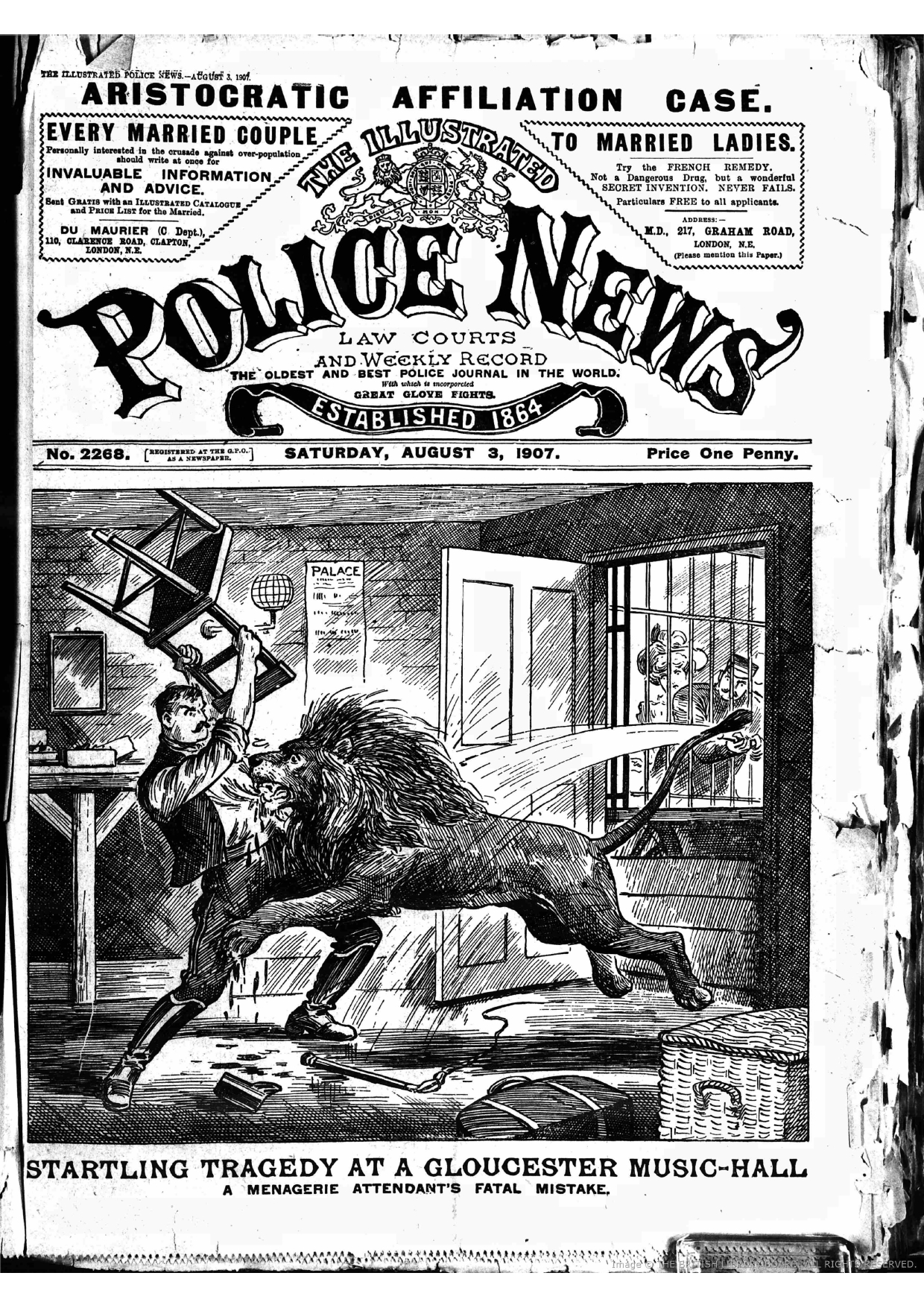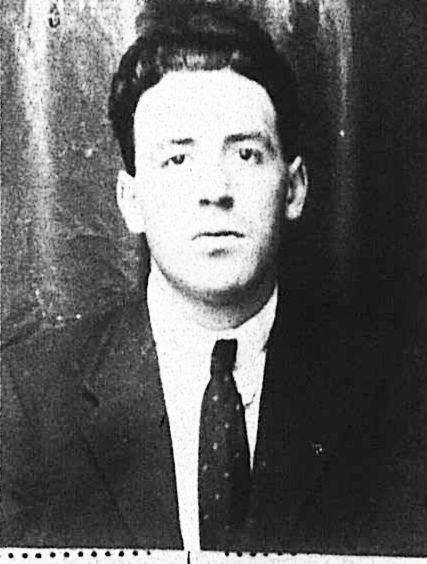Author Guest Post: Chris Wood
Five of the grisliest and most bizarre deaths to have occurred in British Theatres…..
1. Grisly Gloucester Palace of Varieties
In 1907, Gloucester’s Palace of Varieties Theatre was the scene of a somewhat grisly occurrence, when a man was savaged to death by a lion. Gloucester was hosting a famed animal trainer, ‘Miss Ella’, and her entourage of both animals and assistants. One afternoon whilst Miss Ella was dining in the town, one of these assistants – Josef Hasselmenn – for reasons best known to himself – decided to unlock one of the lion cages and release the largest of the caged beasts, a lion named ‘Condor’. Completely untrained and unable to deal with the huge animal, the inevitable outcome leaves little to the imagination, but, needless to say, that old adage of ‘never work with animals’ very much came to fruition that fateful day.

2. Death in Dumfries
The Dumfries Theatre Royal has a long and proud history, considered as it is, as Scotland’s oldest working theatre. On Sunday 10 November 1878, one of its workers however, would pay for his extra curricular diligence with his life. William Teasdale was a property man at the theatre and on this particular Sunday afternoon was preparing for the following days performance. At this primitive time stage lighting was a dubious affair and in this instance was to be created by heating a block of limestone to extreme temperatures, which produced a bright glow to then be directed onto the stage. Alone in the building, Teasdale was in the midst of his work when, without warning, the glass retort used in the heating process shattered due to the overwhelming heat, with shards of glass showering the theatre – and tragically, some lacerating Teasdale’s unsuspecting throat. He was discovered the next morning in a pool of his own blood, having been killed – quite literally – by the limelight.
3. Tragedy at the Theatre Royal
In the early part of 1933 the The Wakefield Theatre Royal bore witness to a horrendously macabre event, when a mysterious paper brown package revealed an awful truth. Twenty three year old Margret Heagney was employed at the theatre, responsible for keeping its punters well oiled in alcohol at the theatre bar.
From Liverpool originally, Margret had moved to Wakefield with her sister Norah, and her income from the theatre was especially welcome when she fell pregnant. Realising however, that she would need extra support with her newborn, Margret moved back to Liverpool to be closer to her bonds of family. It was the evening of 17 February 1933, that a small brown package – stashed high up in the ticket office – was first noticed. Here the parcel remained until over a month later, when, on 22 March cashier Dorothy Bennett decided to investigate a pungent smell which had begun festering inside the ticket office. Reaching the parcel, she began to open the paper, though was soon retching in horror as pieces of human flesh were revealed. It was the body of a baby boy; a piece of silk stuffed into the mouth and a piece of bandage tied tightly around the neck, the baby having clearly endured a horrifying end to its short life. Margret Heagney, having so recently been a heavily pregnant at the the theatre, was immediately under suspicion and arrested in Liverpool. Heagney was found guilty of infanticide – a lesser charge than murder – and sentenced to three months imprisonment, the Judge in the case accepting that at the time when she killed her child ‘her mind was in such a state that she was unbalanced’. And so concluded surely the grisliest of any incident within Wakefield’s Theatre Royal.

4. Leicester Square Letch
London’s Leicester Square Theatre experienced a quite bizarre occurrence in 1933, resulting in – initially at least – a dead man being labelled a ‘dirty minded man with a lecherous instinct’. Thirty seven year old John Docking was an electrician by trade and on 2 February 1933, had been working in the Piccadilly area. Long after his working day was done, he was spotted somewhat bizarrely, high up on the roof of the Leicester Square Theatre around 9pm. A theatre staff member was alerted and went to confront the man. Reaching the roof, the employee spotted Docking peering into a hotel bedroom window across from the theatre. Docking wasn’t seen alive again. His body was found in a crumpled heap at the rear of the theatre, some fifty feet below where he had last been seen. At the inquest into Docking’s death the coroner surmised that Docking had been on the theatre roof in the hope of ‘gratifying a nasty instinct,’ a view that was echoed by the press. However, some years later when Docking’s wife Ethel died, the Docking home was found to be an Aladdin’s den awash with stolen items, with one room in the house even carpeted with a piece stolen from the royal box from the Albert Hall! Could it be then, that Docking fell to his death – not through some voyeuristic intention – but through some ‘recce’ exercise from the theatre roof in a hope of identifying some plunderable items….?!

5. Death by Chorus Girl
In 1905 a strange incident led to the death of a local man in Liverpool’s Rotunda Theatre. Alfred Williams had three children to his first wife Margaret but had since remarried. Unfortunately this second marriage also failed leaving him to lone parent his three children. On 10 January Alfred took his children to the Rotunda to see a pantomime of Aladdin. Sat in the front rows of the pit, Alfred Williams was heartily enjoying the show, until the end of the second act, when his demeanour began to change quite dramatically. His eyes became intently fixated upon one of the chorus girls on stage. He stood up and began waving his arms around whilst yelling: ‘That is my wife! That is my wife!’ The other audience members watched in dumbfounded curiosity at the peculiar sight – until he suddenly collapsed in front of his three children along with the hoards of watching eyes. Medical assistance was quickly summoned as Williams was ushered to a quiet corridor, but he was pronounced dead before the arriving doctor could set to work. The subsequent inquest heard that his heart had not been at its strongest and that ‘excitement could be dangerous to him’. The unexpected sight of seeing his former wife marauding on the Rotunda stage had evidently been too much for him to bear. At the later coroners inquest however, things took a further curious turn, following the evidence of Mrs Williams – the dead mans former wife. She advised the coroner that at no time in her life had she ever set foot on the boards of a theatre stage.
Although bearing a striking resemblance to Alfred’s former wife, it was confirmed that the chorus girl who had been the source of such consternation, was in fact, not his ex wife. This being the case, Alfred Williams’ cause of death was recorded as being initiated through a ‘tragic case of misrecognition’.

Order your copy of Death in the Theatre here.

